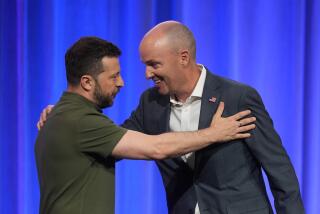Bush, Heading for NATO Talks, Resists Aid to Soviets
- Share via
KENNEBUNKPORT, Me. — President Bush wrapped up his Fourth of July vacation Wednesday and headed for London and the NATO summit, telling reporters that he would be more willing to approve economic aid for the Soviet Union if the Soviets reduced their military spending.
“I think it would be much easier for the West to give them certain kinds of economic assistance” if the Soviets “curtail that defense spending some,” Bush said.
His comments came in response to a speech in Moscow by Soviet Foreign Minister Eduard A. Shevardnadze, who told the Soviet Communist Party Congress on Tuesday that high military spending threatens to ruin the nation.
Economic aid to the Soviets is expected to be an issue both in London and next week in Houston, where Bush will meet with leaders of the six other major industrial powers for their annual economic summit.
French and German officials have been pushing a $15-billion aid plan for the Soviets that Bush has been resisting.
Bush’s remarks came as he ended a five-day vacation here marked by his trademark brand of hectic relaxation: golf, fishing, boating, tennis, but only limited running, in deference, he said, to his 66-year-old knees.
The President has said recently that he hopes to substitute golf for running in his older years, but he admitted that his game, particularly his putting, remains shaky.
Bush golfs by his own, rather loose, rules that allow ample chances to replay bad shots. Even so, he admitted, he lost to Vice President Dan Quayle, an avid golfer, on Monday.
Between games, Bush met with advisers to prepare for the back-to-back North Atlantic Treaty Organization and economic summits.
On the key issue of aid to the Soviets, the two meetings will amount to one weeklong summit for Bush and his counterparts from West Germany, France, Britain, Canada and Italy, who are members of both NATO and the so-called G-7 group of industrial nations. Japan is the 7th member of G-7 but is not a member of NATO.
West German Chancellor Helmut Kohl and French President Francois Mitterrand have both advocated Western aid to help ease the Soviet transition to a free market.
On Monday, Soviet President Mikhail S. Gorbachev joined the call.
“We need more cooperation while the government is working out measures for the transition to a market economy,” Gorbachev said in an interview with CBS television. Asked if he was referring to aid, Gorbachev said yes, although he added that the Soviets will not “pass the hat around.”
But Bush repeatedly has resisted that idea. His advisers argue that sending money to Moscow at the same time that he is raising taxes and cutting programs at home would be highly unpopular.
Also, they argue that aid to the Soviets now would merely give the Soviet bureaucracy a cushion to use to avoid reforms. Similar large Western aid to Poland a decade ago was largely wasted, they note.
A cut in Soviet military spending was the second proposal for changing Soviet priorities that Bush has floated as a seeming condition for U.S. participation in an aid plan. Earlier, he had suggested that the Soviets should cut their economic support for Cuba before the United States would consider an aid plan.
More to Read
Get the L.A. Times Politics newsletter
Deeply reported insights into legislation, politics and policy from Sacramento, Washington and beyond. In your inbox twice per week.
You may occasionally receive promotional content from the Los Angeles Times.











